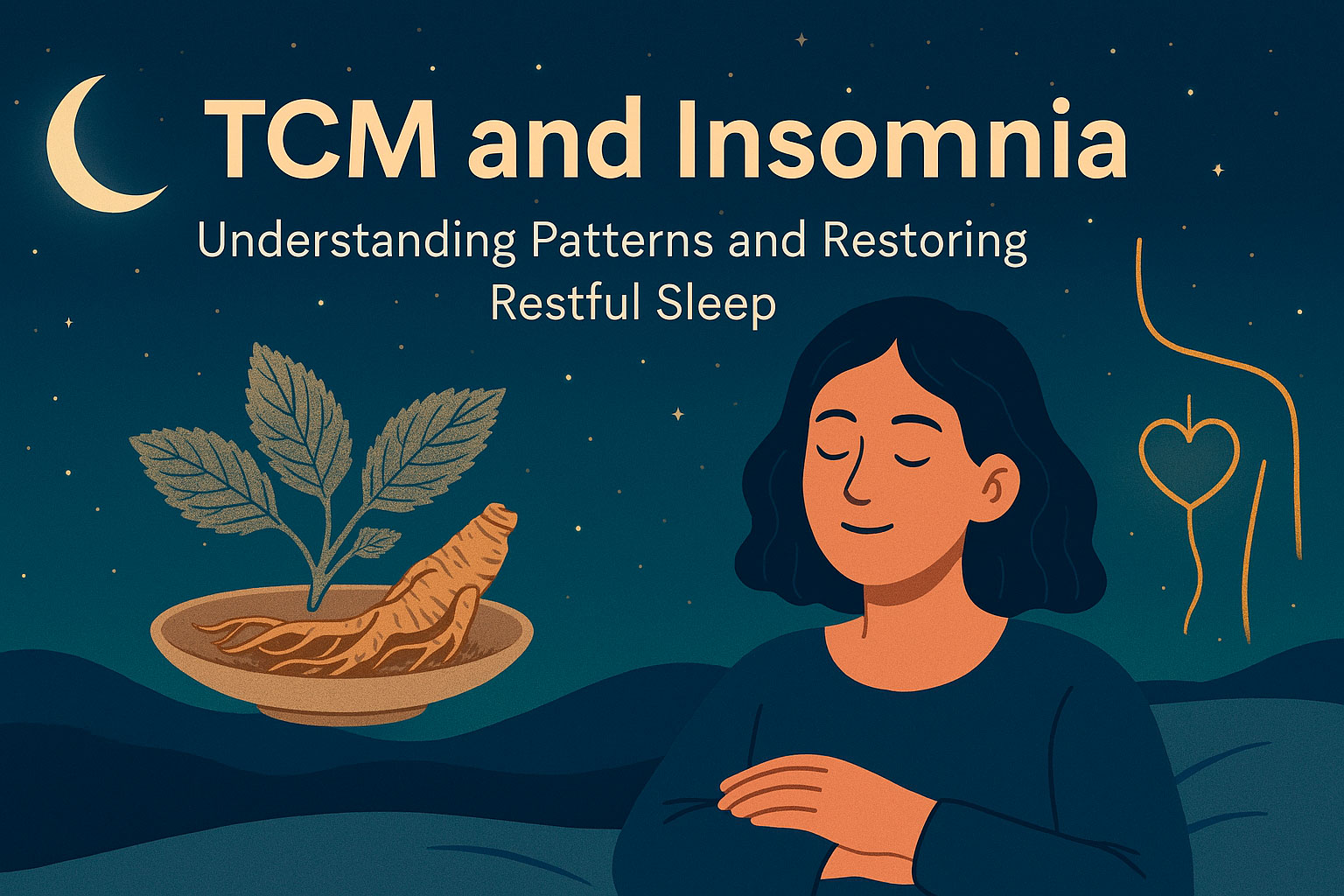Insomnia (失眠) is one of the most common complaints in modern clinical practice. It may present as difficulty falling asleep, frequent waking, light sleep, or early awakening. From the perspective of Traditional Chinese Medicine (TCM), insomnia is not a disease itself, but a manifestation of internal imbalance — particularly involving the Heart, Liver, Spleen, and Kidneys, as well as the Shen (spirit).
This article explores the TCM understanding of insomnia, its common patterns, and how therapies such as herbs, acupuncture, and lifestyle changes are used to restore restful sleep.
🔶 The TCM View of Sleep
In TCM, sleep is the time when Yang Qi enters the Yin — meaning the body’s active energy retreats inward, allowing rest and nourishment.
- The Heart stores the Shen (神, mind/spirit) — it must be calm for sleep to occur.
- The Liver stores Blood — which anchors the Shen at night.
- The Kidney and Heart axis regulates the balance between Fire and Water.
- Disruption in any of these systems can lead to disturbed sleep.
🔶 Common TCM Patterns of Insomnia
1. Heart and Spleen Deficiency (心脾两虚)
- Symptoms: Difficulty falling asleep, fatigue, poor memory, palpitations, loose stools, pale complexion
- Tongue: Pale, thin coating
- Pulse: Weak or thin
🧾 Treatment principle: Tonify Qi and Blood, nourish the Heart, calm the Shen
Formula: Gui Pi Tang (Restore the Spleen Decoction)
2. Heart Yin Deficiency (心阴虚)
- Symptoms: Waking often, dry mouth, night sweats, palpitations, mental restlessness
- Tongue: Red, little or no coating
- Pulse: Thin, rapid
🧾 Treatment principle: Nourish Yin, clear deficiency Heat, calm the Shen
Formula: Tian Wang Bu Xin Dan (Emperor of Heaven’s Special Pill)
3. Liver Fire Flaring (肝火扰心)
- Symptoms: Irritability, dream-disturbed sleep, headache, bitter taste, red eyes
- Tongue: Red with yellow coating
- Pulse: Wiry, rapid
🧾 Treatment principle: Clear Liver Heat, sedate Fire, calm Shen
Formula: Long Dan Xie Gan Tang (Gentiana Drain the Liver Decoction)
4. Phlegm-Heat Disturbing the Heart (痰热扰心)
- Symptoms: Restlessness, oppressive chest sensation, dizziness, nausea, heavy head
- Tongue: Yellow greasy coating
- Pulse: Slippery, rapid
🧾 Treatment principle: Clear Heat, transform Phlegm, calm Shen
Formula: Wen Dan Tang (Warm the Gallbladder Decoction)
5. Disharmony of Heart and Kidney (心肾不交)
- Symptoms: Difficulty falling asleep, tinnitus, lumbar soreness, anxiety, red cheeks
- Tongue: Red with scanty coating
- Pulse: Thin, rapid
🧾 Treatment principle: Nourish Yin, descend Fire, unify Heart and Kidney
Formula: Huang Lian E Jiao Tang (Coptis and Ass-Hide Gelatin Decoction)
🔶 Acupuncture and Insomnia
Acupuncture can regulate the nervous system, balance Qi, and calm the mind.
| Point | Function |
|---|---|
| HT7 (Shenmen) | Nourishes Heart Blood and calms Shen |
| SP6 (Sanyinjiao) | Harmonizes Liver, Spleen, and Kidney |
| Yin Tang | Calms spirit, relieves anxiety |
| Anmian (Extra Point) | Specifically used for sleep disorders |
| KD3 (Taixi) | Supports Kidney Yin |
Treatment frequency: 1–3x/week for 4–6 weeks, depending on chronicity.
🔶 Lifestyle Tips from TCM
- Avoid overstimulation in the evening (news, screens, arguments)
- Create a Yin environment: dim light, soft sounds, gentle breathing
- Avoid heavy meals or alcohol close to bedtime
- Go to bed before 11 PM to align with the Liver’s time for blood storage
- Drink calming teas: Suan Zao Ren (Zizyphus), Longan + Red Dates, Chamomile
🔶 Conclusion
Insomnia in TCM is not treated with a single solution, but through differentiation of patterns, based on the unique constitution and emotional landscape of the patient. By calming the Shen, nourishing the Blood, and harmonizing organ systems, TCM offers a gentle yet effective pathway back to restful, natural sleep.


发表回复